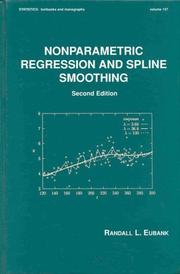| Listing 1 - 5 of 5 |
Sort by
|

ISBN: 0824793374 9780824793371 Year: 1999 Volume: 157 Publisher: New York (N.Y.) Dekker
Abstract | Keywords | Export | Availability | Bookmark
 Loading...
Loading...Choose an application
- Reference Manager
- EndNote
- RefWorks (Direct export to RefWorks)
Mathematical statistics --- Regression Analysis --- Nonparametric statistics --- Spline theory --- 519.234 --- Non-parametric methods --- 519.234 Non-parametric methods --- Regression analysis --- Spline functions --- Approximation theory --- Interpolation --- Analysis, Regression --- Linear regression --- Regression modeling --- Multivariate analysis --- Structural equation modeling --- Distribution-free statistics --- Statistics, Distribution-free --- Statistics, Nonparametric
Book
ISBN: 0824778693 9780824778699 Year: 1988 Volume: 90 Publisher: New York Dekker
Abstract | Keywords | Export | Availability | Bookmark
 Loading...
Loading...Choose an application
- Reference Manager
- EndNote
- RefWorks (Direct export to RefWorks)
Mathematical statistics --- Regression Analysis --- Nonparametric statistics --- Spline theory

ISBN: 0824723651 9780824723651 Year: 2006 Publisher: Boca Raton: Chapman & Hall/CRC,
Abstract | Keywords | Export | Availability | Bookmark
 Loading...
Loading...Choose an application
- Reference Manager
- EndNote
- RefWorks (Direct export to RefWorks)
Book
ISBN: 9780470016916 0470016914 Year: 2015 Publisher: Chichester, West Sussex, United Kingdom Wiley
Abstract | Keywords | Export | Availability | Bookmark
 Loading...
Loading...Choose an application
- Reference Manager
- EndNote
- RefWorks (Direct export to RefWorks)
Multivariate analysis --- Statistical functionals --- Linear operators --- Multivariate analysis. --- Statistical functionals. --- Linear operators. --- Linear maps --- Maps, Linear --- Operators, Linear --- Operator theory --- Functionals --- Mathematical statistics --- Multivariate distributions --- Multivariate statistical analysis --- Statistical analysis, Multivariate --- Analysis of variance --- Matrices
Book
ISBN: 9781420066500 1420066501 Year: 2012 Publisher: Boca Raton Chapman and Hall/CRC
Abstract | Keywords | Export | Availability | Bookmark
 Loading...
Loading...Choose an application
- Reference Manager
- EndNote
- RefWorks (Direct export to RefWorks)
"Preface When one looks at a book with 'statistical computing' in the title, the expectation is most likely for a treatment of the topic that has close ties to numerical analysis. There are many texts written from this perspective that provide valuable resources for those who are actively involved in the solution of computing problems that arise in statistics. The presentation in the present text represents a departure from this classical emphasis in that it concentrates on the writing of code rather than the development and study of algorithms, per se. The goal is to provide a treatment of statistical computing that lays a foundation for original code development in a research environment. The advancement of statistical methodology is now inextricably linked to the use of computers. New methodological ideas must be translated into usable code and then numerically evaluated relative to competing procedures. As a result, many statisticians expend significant amounts of their creative energy while sitting in front of a computer monitor. The end products from the vast majority of these efforts are unlikely to be reflected in changes to core aspects of numerical methods or computer hardware. Nonetheless, they are modern statisticians that are (often very) involved in computing. This book is written with that particular audience in mind. What does a modern statistician need to know about computing? Our belief is that they need to understand at least the basic principles of algorithmic thinking. The translation of a mathematical problem into its computational analog (or analogs) is a skill that must be learned, like any other, by actively solving relevant problems"--
Statistics --- C++ (Computer program language) --- R (Computer program language) --- Mathematics --- Data processing --- 519.2 --- 681.3*G3 --- GNU-S (Computer program language) --- Domain-specific programming languages --- 681.3*G3 Probability and statistics: probabilistic algorithms (including Monte Carlo);random number generation; statistical computing; statistical software (Mathematics of computing) --- Probability and statistics: probabilistic algorithms (including Monte Carlo);random number generation; statistical computing; statistical software (Mathematics of computing) --- 519.2 Probability. Mathematical statistics --- Probability. Mathematical statistics --- Statistics - Data processing
| Listing 1 - 5 of 5 |
Sort by
|

 Search
Search Feedback
Feedback About UniCat
About UniCat  Help
Help News
News